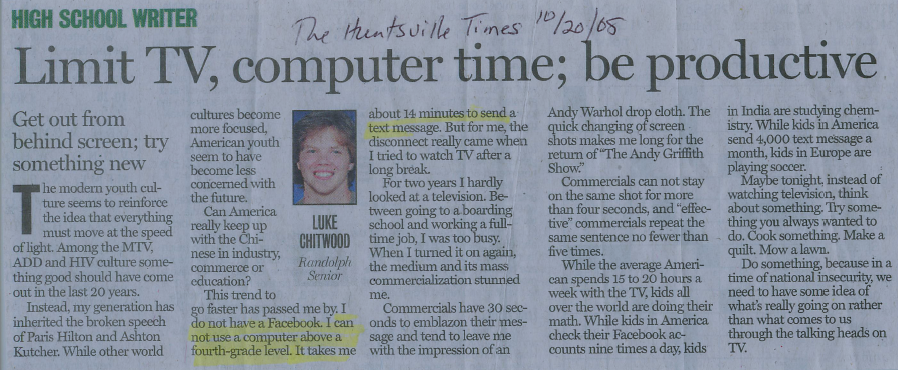Technology is good. Computer illiteracy is bad.
A dear friend recently sent me an article from Alabama’s The Huntsville Times. I think my friend was trying to suggest that too much TV for kids can be a bad thing, which I agree with. But because the article is so painfully misguided, I felt the need to respond. Unfortunately (and ironically), the article is not online, so I scanned and OCR-ed it (you know, with computers).
Here it is in its entirety. Beware. Reading it may give you an aneurysm.
https://www.giantpeople.com/wp-content/uploads/2008/11/2008-10-20-huntsville-times.png

HIGH SCHOOL WRITER
LUKE CHITWOOD
Randolph Senior
Limit TV, computer time; be productive
Get out from behind screen; try something new
The modern youth culture seems to reinforce the idea that everything must move at the speed of light. Among the MTV, ADD and HIV culture something good should have come out of the last 20 years.
Instead, my generation has inherited the broken speech of Paris Hilton and Ashton Kutcher. While other world cultures become more focused, American youth seem to have become less concerned with the future.
Can America really keep up with the Chinese in industry, commerce or education?
This trend to go faster has passed me by. I do not have a Facebook. I can not use a computer above a fourth-grade level. It takes me about 14 minutes to send a text message. But for me, the disconnect really came when I tried to watch TV after a long break.
For two years I hardly looked at a television. Between going to a boarding school and working a full-time job, I was too busy. When I turned it on again, the medium and its mass commercialization stunned me.
Commercials have 30 seconds to emblazon their message and tend to leave me with the impression of an Andy Worhol drop cloth. The quick changing of screen shots makes me long for the return of “The Andy Griffith Show.”
Commercials can not stay on the same shot for more than four seconds, and “effective” commercials repeat the same sentence no fewer than five times.
While the average American spends 15 to 20 hours a week with the TV, kids all over the world are doing their math. While kids in America check their Facebook accounts nine times a day, kids in India are studying chemistry. While kids in America send 4,000 text message [sic] a month, kids in Europe are playing soccer.
Maybe tonight, instead of watching television, think about something. Try something you always wanted to do. Cook something. Make a quilt. Mow a lawn.
Do something, because in a time of national insecurity, we need to have some idea of what’s really going on rather than what comes to us through the talking heads on TV.
If this is what passes for scholarship in the United States, then God help us. Say it with me: Ignorance is not a virtue. The writer equates watching television with using computers and then suggests that we should step away from the screens “to have some idea of what’s really going on…” Worse, he says, “I do not have a Facebook. I can not use a computer above a fourth-grade level.” If the United States is turning out high school seniors who don’t know how to use computers and think that using them is a bad idea, then we’re in serious trouble.
I’m sure the writer is a good kid, and I mean no disrespect. But it’s going to take more than being a good kid to succeed in the 21st century economy. Here’s a reality check for you:
- Technology is good.
- Knowledge of technology is good.
- Technology and the knowledge of how to use it makes us more efficient as a society.
- Efficiency is good. More efficient = more productive. The standard of living increases for everybody as a direct result of technology.
- Television and computers have already merged. You don’t have to watch TV the old way. TiVo it. Or watch it on YouTube. President-Elect Barack Obama was elected as a direct result of a technology-centered campaign.
- Ignore technology at your own peril.
By way of comparison, I first got my MySpace (and later Facebook) account to keep up with my young and hip niece and nephew (who were then in high school and are now in college). My 10-year-old daughter has her own money-making blog. My 12-year-old son composes music with Garage Band on our iMac. And my 14-year-old son uploaded his first video to YouTube before I did. All of these kids are learning, growing, and opening doors of opportunity as a direct result of being technologically literate.
You can also learn about cooking, quilting, and landscaping on the Internet.
So this technology-is-stupid-even-though-I-have-not-tried-it attitude must end. Or we as a nation will be left behind. I’m pretty sure the kids in India, China, and Europe know how to use Facebook. Computer illiteracy in the 21st century is at least as dangerous as book illiteracy in the 19th century. Keep up or be left behind.
Technology is good. Ignorance is not a virtue.



See also:
Hitchens on Palin and Science
http://blogs.discovermagazine.com/cosmicvariance/2008/10/27/hitchens-on-palin-and-science/
Greetings Art,
Good points.
Regards,
Erik
OK, I coincidentally ran into this just minutes later:
http://dilbert.com/strips/comic/2008-11-20/
OK, I get your point, but I think you are wrong in how you worded parts of it:
> 1. Technology is good.
Technology is neither good nor bad. Technology can be put to good uses, or bad uses, or neutral uses. But technology itself does not have virture.
>4. Efficiency is good.
Efficiency of good things can be good (but not always – see ’87 stock crash e.g.). Anyone who has automated something so that it can do a 100 things in the time it will take you to do one otherwise, and done it wrong, knows how bad efficiency can be when not implemented correctly.
I think a more appropriate sentiment is that technology is not inherently bad, it can make your life better and more productive (and it can do the opposite just as easily). But ignoring technology is limiting, just as much as hyper-focusing on it is.
Learn to use technology and incorporate it into your life, but learn to live in the real world with a limited amount of technology too – it will help you appreciate where technology really does provide an advantage.
I can not use a computer above a fourth-grade level.
Is there any connection with the fact that he can’t write above a fourth-grade level?